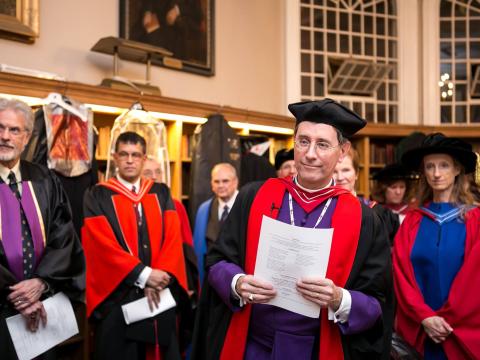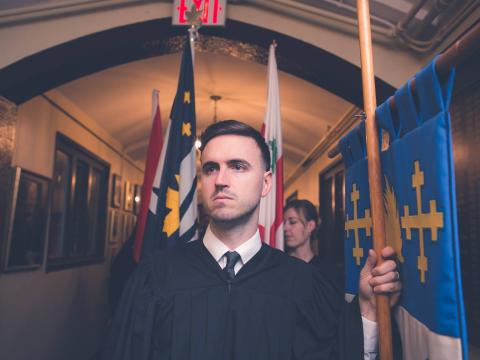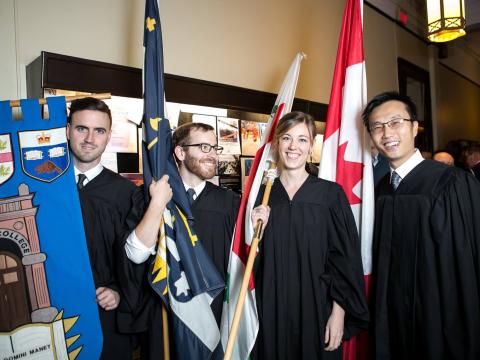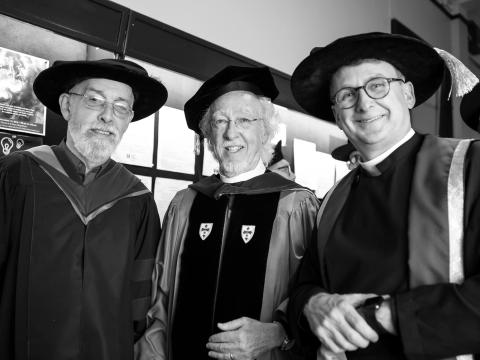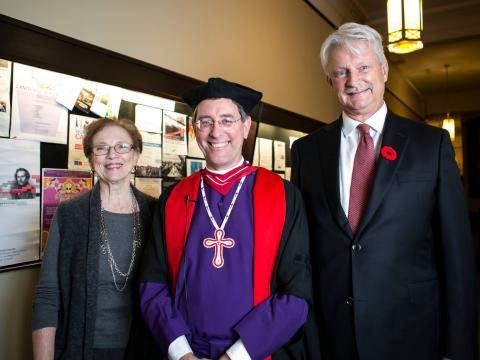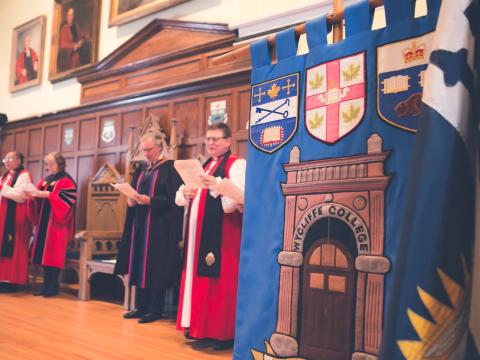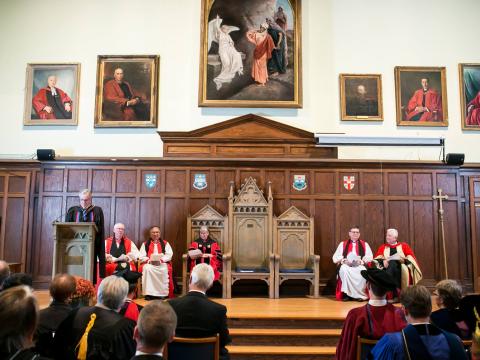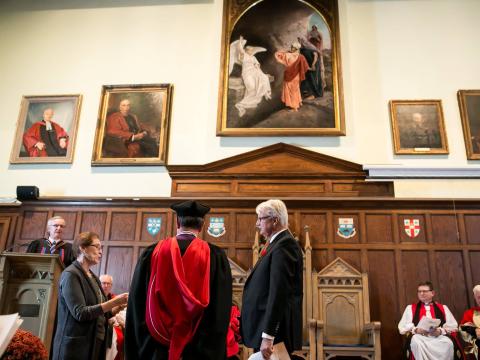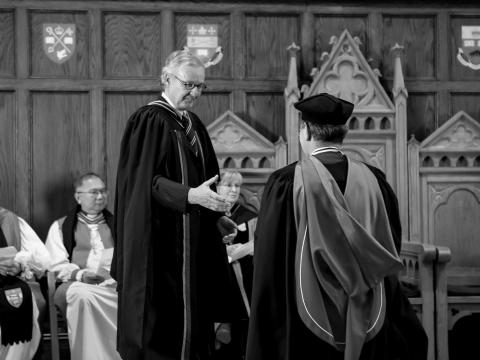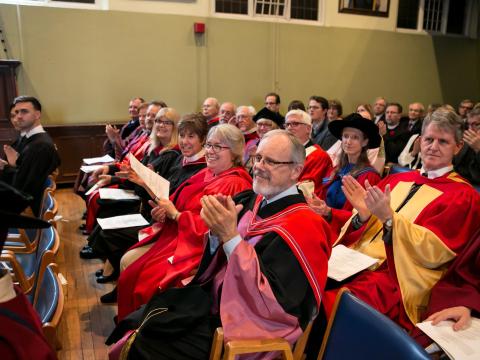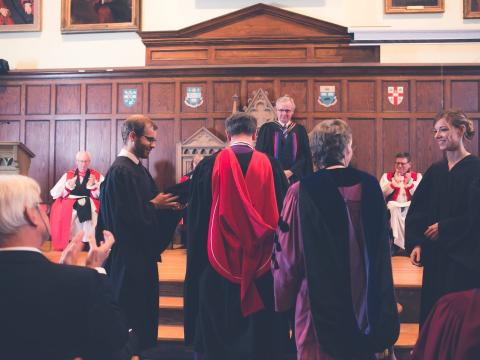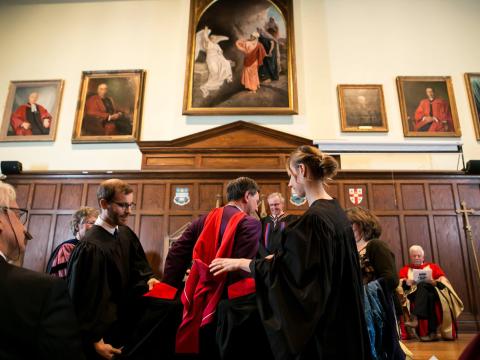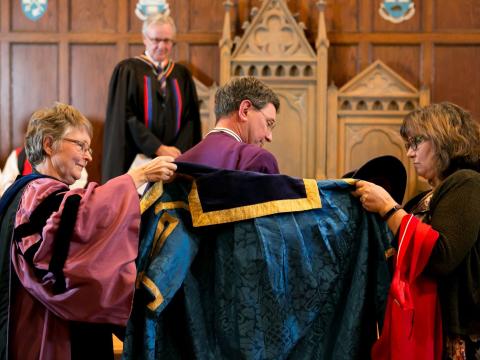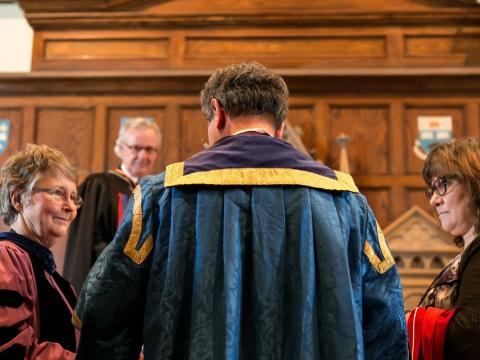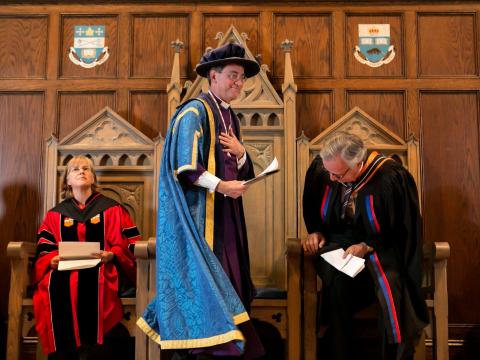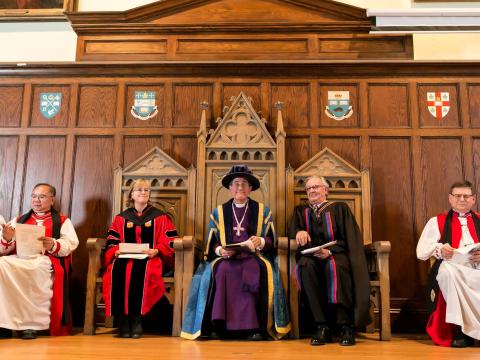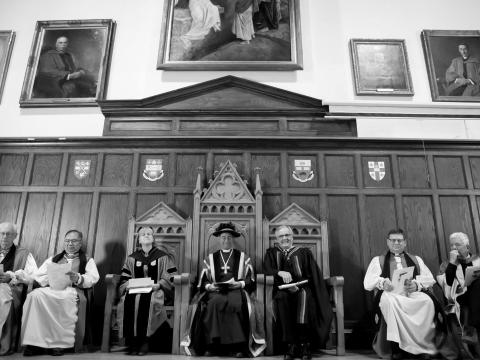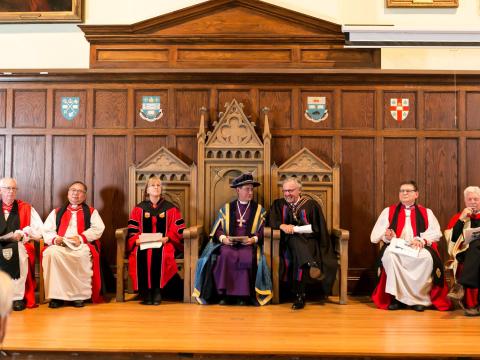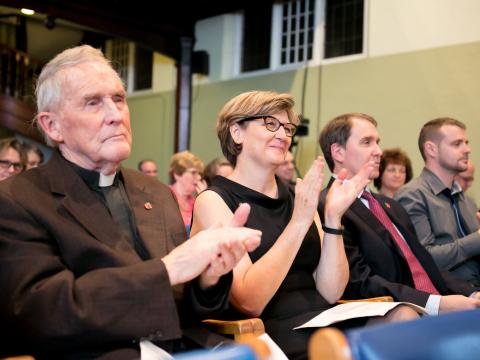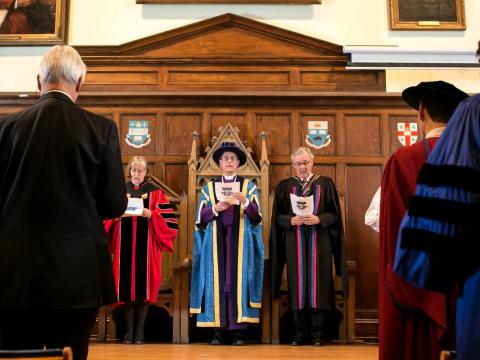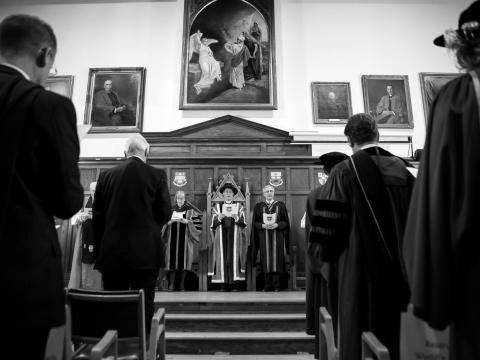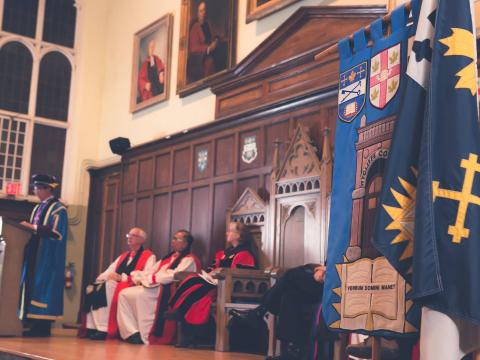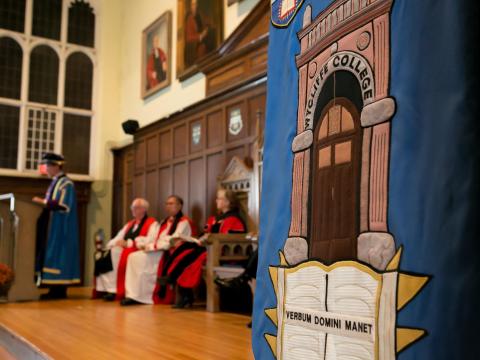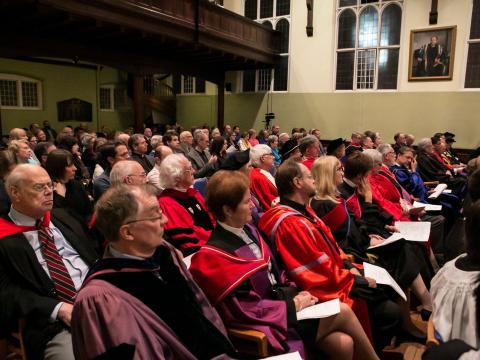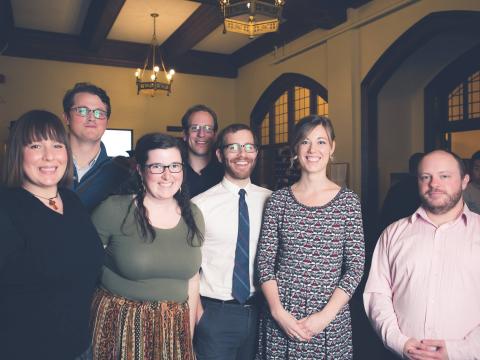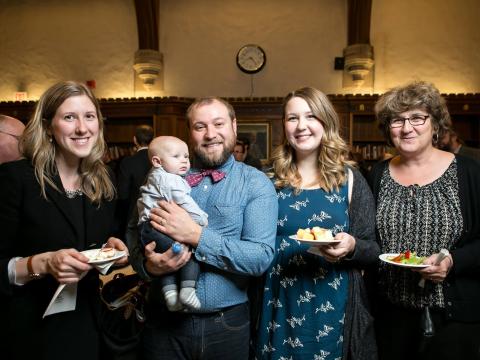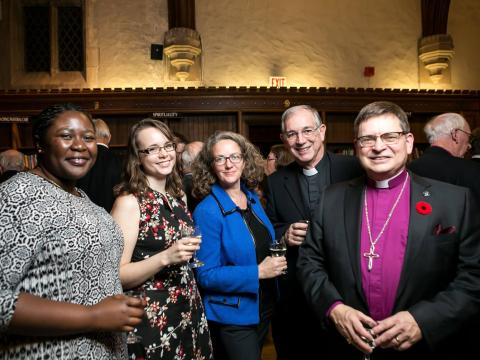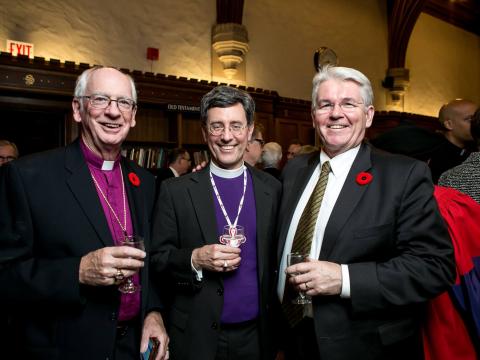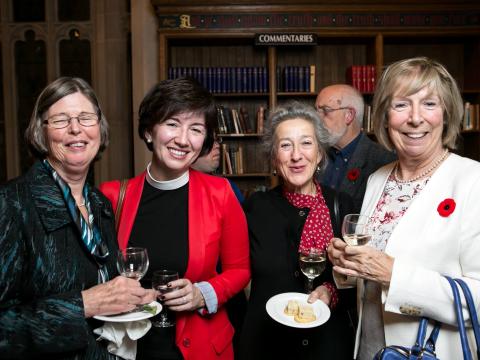Wycliffe College Installation Address
The Rt Rev. Dr Stephen Andrews
4 November 2016
You may watch the installation ceremony here.
“Well, it looks good on paper.’ This is what I said to a colleague from Oxford who phoned me when it was announced that I would be leaving the Diocese of Algoma, and taking up the position of Principal at Wycliffe College. ‘Weed,’ my old friend exclaimed, ‘what you’re doing would make no sense, here. The logical order is that you head up a theological college and then become a bishop.’
I suppose what my friend says is generally true, and it was certainly true for my predecessors, Bishops George Sumner and Peter Mason. But an opportunity to do it backwards actually does look good on paper. On the analogy that the most experienced coaches would best serve their sport by tutoring the junior varsity rather than the varsity team, it makes a certain amount of sense that a bishop might want to play a role in the formation of clergy before they are ordained.[1] Most bishops will testify that it can be enormously frustrating to try to do it afterwards . . . And in my case, this post presents a situation where other past identities as a parish priest and academic administrator can converge. So, when offered the chance to have a hand in theological education at a time when, both locally and globally, the Church needs mature and dedicated leaders capable of making Christ real to a spiritually hungry and confused world, I felt duty-bound to accept. Besides, as Bishop Mason has said to me, ‘This is the best job in the Church.’
Let me say right off that being the Bishop of Algoma was a pretty great gig too, and I continue to be grateful for my friendly association with Thorneloe University. But there have been many moments during my brief tenure here that I’ve been conscious of what a privilege and a blessing it is to serve this College. I have enjoyed the fellowship of a worshipping community as we assemble for daily prayer; I have heard a series of outstanding reflections on the Canticles of Scripture delivered by Wycliffe faculty (available online, by the way); I have heard erudite lectures on the work of the Dutch humanist theologian, Erasmus, and personal and moving papers on the late Professor John Webster, by three of his former students. I have participated in a pub discussion with graduate students about what they find irritating in sermons (no names were mentioned); I have talked with Masters’ degree students, eager to learn about God and explore the contours of his call on their lives; and I have talked with professors, also eager to learn about God and to share what God is doing in their lives through their scholarly work. I have had hands laid on me by the Wine Before Breakfast community. I have pitched up in the midst of an enormously gifted staff, possessing an intimate and arcane knowledge of how this College functions, from the glossolalia of the Quality Assurance Framework[2], to how to trick the heating system in the Victorian building to think it is winter. I have heard more than one bishop say how wonderful it would be to return to theological college, and now I get to live that dream – but without the exams! (In a bit of shameless marketing, let me add that we do welcome episcopal visitors, and we would be happy to introduce you to our faculty and programmes!)
But I’m afraid that my impressionistic description of the College may be misleading. As fun and stimulating as Wycliffe has been for me in these first few weeks, it’s not all tea and Quidditch. What is Wycliffe College in its essence?
Wycliffe College is a centre for evangelical Christian life and thought, with a primary task of training leaders for the Church both in Canada and abroad, and a secondary task of preparing scholars for the academy. It is a seminary in the Anglican tradition, but our students come from over fifty different denominations. The word seminarium bears the notions of planting, nurture, growth, rootedness, reproduction, and ‘formation’, so our aim is to cultivate lifelong disciple-makers, formed in community, and informed by Bible-centred teaching. We do this in the conviction that, by God’s grace, Wycliffe will be an instrument in the renewal in the Church through prayer, formation of character, excellence in preaching and rigorous thought. And we see our task as a response to, and an embodiment of, the love of Christ. And so we sing, ‘King of Love, O Christ, we crown thee, Lord of thought and Lord of will.’
Now, in one respect, Wycliffe’s mission has never changed, just as the needs of the Church have not changed. Humanly speaking, the Church’s usefulness and well-being has always depended on the quality of her leadership. A common denominator among parishes that are thriving is that they all have excellent clergy, individuals with strong pastoral gifts who are theologically literate and mission focussed, and who, as the Ordinal of the Book of Alternative Services stipulates, model their lives upon the Scriptures.[3] Consequently, the College will continue to give priority to the teaching and preaching of the Word and listen attentively to the wisdom of the post-Apostolic and Patristic figures that has shaped our tradition in the Church’s formation and re-formation. And we will continue to be intentional in our attempt to fashion a community that fosters spiritual health and growth for individuals and families. For it is only in the cultivation of a deeper discipleship rooted in a love for Jesus, his Word, and his mission, that future leaders will be effective in renewing the Church, and that the Church will be an effective agent in transforming the world.
Identity: Anglican and Evangelical
Having said that there are aspects of Wycliffe’s mission and the Church’s need that have not changed, it is the case that our contexts have changed since our founding in 1877, and the meaning of words have changed. Wycliffe has by times been known as an ‘evangelical Anglican’ or an ‘Anglican evangelical’ institution. Both adjectives have been used pejoratively. The term ‘evangelical’ has not been well understood by the media and has been applied to a variety of groups, sets of belief and defensive postures that can be an impediment to witness and the building of trusting relationships in broader church encounters. The word ‘Anglican’ in the minds of others means a kind of establishment social liberalism characterised by woolly thinking. There are, in fact, Anglicans and evangelicals who aver that the terms are mutually exclusive.
One of Wycliffe’s unstated, but necessary projects is to reclaim and reaffirm the integrity of evangelical Anglicanism. To begin with, the English word ‘evangelical’ is first used as a description of a tradition in Protestant Christianity by the Anglican clergyman William Tyndale in the 1530s. To the extent that the Anglican Church of today treasures Scripture in the vernacular and holds a reformed doctrine of justification by faith, it may be justly said that the Church is evangelical in the original meaning of the term.
Moreover, why would we not all want to be known as evangelicals? ‘Evangelical’ is a good word. It denotes ‘the gospel’, the good news of God’s redemptive acts in the person of Jesus Christ. It has a noble heritage in the lives we celebrate in our Church Calendar, including Charles Simeon of Cambridge, and the social reformer, William Wilberforce. One of my mentors, John Stott, would go so far as to say that it is a fair adjective to apply to the teaching and work of the Church from the earliest periods. He used to call evangelicalism ‘Bible Christianity’, and its core convictions regarding the supremacy of Scripture, the centrality of the cross, the need for conversion and the imperative for evangelism, can be found in the mainstream of historic, orthodox faith. Indeed, these tenets stand at the heart of Wycliffe’s Six Principles, and they continue to inspire the missionary spirit that directs the work of the Institute for Evangelism, Wycliffe Serves!, the Master of Divinity Pioneer Ministries stream, the Master of Theological Studies in Development, and the Certificate in Missional Leadership and Formation.
Now, it should be understood that the Anglican evangelicalism of Wycliffe College is of a particular type. It has been largely shaped by its British roots and the piety of the 1662, 1918 and 1959 Book of Common Prayer. Wycliffe’s evangelicalism has been more characteristic of a reaction to high church ritual and liberal theology, than of the American brand of evangelicalism that has grown out of revivalism and fundamentalism. The more traditional idiom of the BCP is, in fact, what drew me to Anglicanism some thirty-seven years ago, and it’s abiding allure is evident at Wycliffe in the number of non-Anglican students who become Anglicans during their time here.
Which brings me to the contemporary articulation of evangelicalism I see among many of our students. I believe that there is a new confidence in evangelicalism among younger Christians that makes it less reactionary. For example, it is more open to ritual modes of worship, and it has a more nuanced view of how to interpret the Bible. The dichotomy of evangelism and social responsibility that bedevilled evangelicalism a generation ago is incomprehensible to a newer generation. Young evangelicals today demonstrate a deep commitment to community life and the health of the environment. Today it would be a mistake to define evangelicalism as a rejection of or in contrast to something else, or as a political movement. Similarly, it can no longer be said that evangelicalism is anti-intellectual in character. There is a robust scholarly tradition and apologetic ability that characterised evangelicalism in the time of the Reformers, and it is a tradition and ability that thrives here at Wycliffe College today. We take very seriously our mission to foster engagement with the issues and concerns of our culture, as we go about our work of scholarship both within and for the Church.
Evangelical distinctiveness and the issues that divide us
If it is authentic, evangelicalism will always be rooted in the gospel, the proclamation of a self-revealing God who redeems and transforms. People are drawn to the evangelical expression of the Christian faith because of its deep understanding of the human condition and of humanity’s need for God. In its healthiest form, it relates to the universal human aspirations for significance, community and transcendence, and, in its Anglican expression, it directs these aspirations to God in liturgical forms of worship, and it orders its work for God in the church and the world through an episcopal polity. Most of all, it attracts people to the person at the heart of this faith, to the beauty, power and compassion of Jesus, the Incarnate Word. For this reason, we believe that evangelicalism is good for Anglicanism, just as Anglicanism is good for the Church Catholic.
But in saying this, we obliged to say that God’s Church is enriched by diversity. An evangelical Anglican is compelled to say this by virtue of the fact that evangelicalism itself is the dominant form of Anglicanism in the various languages and cultures of the global Church. But with diversity comes tension. So let me say a couple of things about the value of diversity and the threat of division.
The first thing to say is that evangelicalism is generally understood to occupy what is called a ‘conservative’ position on many of the issues that strain the Church’s unity. But we must not caricature. Attitudes and opinions in the evangelical community are not monolithic. We wrestle with the question of what is a compassionate response to people whose perspectives differ from ours, and the arguments we have amongst ourselves are often highly nuanced. In our own way and in our own time, we will continue to grapple with the ethical and philosophical challenges facing the Church, and we hope that those outside our community will continue to make a place for us in the discussion. For, while some of the views we hold may seem outdated in our Western contexts, they nevertheless seek to be faithful to the traditions of the Church from the time of the Apostles, and they are the views most commonly held in the Church of the Majority World. Moreover, I would suggest that evangelicals and non-evangelicals actually need each other as we seek to make sense of the rapidly changing contours of our own culture. How is the good news of the man Jesus Christ made real in a society of gender plurality; where sexuality is expressed and exploited in ways that we think may be detrimental to the welfare of the individual and our common life, and where ‘solutions’ to the burdensomeness of life raise questions about life’s sanctity and our duty to care for one another?
This leads me to my second point, and that is, as evangelical Anglicans, we must continue to be nurtured by the Anglican tradition and play our part within the ministry of the Anglican Church of Canada. I feel that it is important to say this at a time when loyalty to the Church is wavering in some quarters.
Now, it is salutary to remember that our own history both as evangelicals and as Anglicans is one of violent division and political compromise. Our tradition can be traced to the pooled blood and charred remains of the Reformers. Is it possible that the religious freedom we fought and died for has infected us with an unhealthy longing for personal and ecclesial liberty, and that a propensity for disunity, and not unity, is actually in our Anglican DNA, despite what we say about tolerance and comprehensiveness?
While it may not be so simple as all that, I confess to believing that this is so. But it is not just in Protestant genes. For all that unites us as a common humanity, there is something within every human soul that divides us from one another. It is a drive that resonates with the story in the Garden of Eden. It is the appetite for the forbidden, the lust for power, the need to assert our independence and control our future. It is what makes the simple command, ‘Do unto others’, ubiquitously relevant – and ubiquitously impossible. So how can we find a way forward? What shall we do with our ‘unhappy divisions’?
In place of the ‘radical postures, strident denunciations and moralistic confessionalism’, advises a former Professor of Theology at Wycliffe, Oliver O’Donovan, we need a ‘stepping back, an untangling of the skein, an attempt at reconciling conflicting views, a toning down of exaggerated positions, a forging of coalitions, a squaring of circles, a finding of common-sense ways through’ the impasse before us.[4] Professor O’Donovan’s call for humility here is rooted in a biblical view of the Church. The Church, and thus the Christian life, is the place where we ‘bear each other’s burdens’ (Gal 6.2); where we do not ‘insist on our own way’ (1 Cor 13.5); where we consider others ‘better’ than ourselves, and their interests better than ours (Phil 2.3-4), their desires more important than ours (Rom 15.1-3); and where we defer to the ‘weaker consciences’ of another person (1 Cor 8.7-12).
But this is not simply a matter of rising to a higher moral standard or living like characters in a Horatio Alger novel. It is about gathering around the suffering Christ and discovering ourselves as his Church as he feeds and sends in his name. The former Archbishop of Canterbury, Rowan Williams, gets at this when he speaks about the ‘one, holy, catholic and apostolic Church’. He writes:
The simple thing I want to say is that all four marks of the church are about Jesus Christ. The church is one because Jesus Christ is one; the church is holy because Jesus Christ is holy; the church is catholic because Jesus Christ is the saviour of all; the church is apostolic because, as the Father has sent Jesus, so Jesus sends us. In other words, if we are to understand the nature of the church at all, we are to understand who Jesus Christ is and what he does.[5]
The quest for mutual understanding and unity is not going to get any easier, as we have already intimated. And it will certainly be the case that there are differences of opinion within the Church that are mutually irreconcilable. But we must not allow this to distract us from the essential question of who Jesus Christ is and what he does. In the answer to this question we shall have to reckon with the truth that unity in the Church is costly – it involves compromise, the surrender of what we cherish, and the willingness to suffer for the welfare of another. But in this there is also great hope and power. For as we grow in our understanding of who Jesus Christ is and what he does, so shall we become a genuine source of life for all in a world that cries out for healing and wholeness.
It is instructive that Wycliffe College was founded at about the same time that the Reformed Episcopal Church was being established in North America. The impetus for the establishment of this secessionist group was the same as that which gave rise to the founding of the College – a concern about Tractarianism. The College founders, however, chose the path of seeking to reform the Church from within. While this reformation project continues, and its success is often questioned in our day, the good the College has brought the Church through its faithful evangelical Anglican witness is undeniable. And so we pray that the College will continue to model both confidence in the truth of the gospel and humility in our presentation of it, both now in this time of struggle, and for generations to come.
Leadership for the contemporary church
My friends, the challenge before us, as you can see, is a daunting one. I hope that you will agree that Wycliffe’s mandate, indeed the mandate of every theological institution serving the Church, is as relevant as ever. And I hope, furthermore, that I have helped to make the case that future Church leaders need rather more training, and not less.
However, it is commonly asked whether or not the seminary mode of theological education is antiquated and out of touch with the reality of today’s church. It is noted that the rate of change in the institutional church is not keeping pace with our rapidly shifting culture. We are all familiar with the challenges: the age demographic of the church is older than the surrounding population; young people are suspicious of institutions and do not relate to their structures of authority; there has been a loss of Christian memory and, hence, the Christian imagination is unintelligible to those outside the Church; and this has been accompanied by the growing marginalisation, not to say hostile ostracism, of all religion in modern Western culture. The values of our society are increasingly post-modern, with no reference to universally recognised truth; while there is a nearly universal obsession with information technology which shrinks, shallows and distorts the world.
For seminaries, the ecclesiastical decline means that it will be more difficult to find placements for graduates and to grow the base of those who support our colleges. Moreover, as the parochial church becomes less viable, strategies are emerging for training people locally for non-stipendiary or part-time ministry. While the pressures of finances and mobility that cause bishops and others to look for alternatives to residential theological college training are understandable, it must be said that these strategies actually undermine the Church’s vitality, since they provide neither the formation nor depth of learning required by the task of making disciples in today’s world.
These challenges have already proved to be insurmountable for some North American theological colleges, and we have begun to hear of institutional closures. Those of us that remain are attempting to respond to these challenges through the better use of technology and growing collaboration. The resources of the Toronto School of Theology in the context of the University of Toronto, an institution ranked in the top twenty-five in the world, are valuable assets that we must continue to try to leverage better. For the welfare of the Church, Anglican institutions will have to overcome the competitiveness that isolates them, and collude in finding ways of serving the needs of the Church more effectively. In this respect, I want to record my gratitude for the work of the Ontario Provincial Commission on Theological Education, and especially to Thorneloe University, to Huron College, and to our neighbours on the north side of Hoskin Avenue, for their warm welcome to me and for their partnership in our educational mission.
Theological colleges will also have to be more responsive to the needs of extra-institutional groups and structures. I have in mind, for instance, Wycliffe’s involvement in the Indigenous Leadership Week, where the College is host to aboriginal Church leaders from across Canada as they worship, learn and take counsel together. I think that we may be able to do more to resource continuing education locally, and to offer courses of study in modular or more intensive formats.
But nothing takes the place of formation in community, and in the future, I believe that seminaries will have to take a more active role in recruiting leadership, both parochially and in institutions of higher education. We must provide greater incentive for people to relocate and live in a Christian community of learning, and, with fewer financial resources available at the parish or diocesan levels, we must be prepared to assume a greater share of the cost of education. Of course, in this respect we will also want to cultivate a healthy practise of stewardship among our students and graduates.
For, in the end, I believe that the most persuasive marketers for Wycliffe’s educational formation will be the graduates themselves: individuals who embody the College’s mission values, and who have been given the tools to live entrepreneurially for Christ in the Church and in the world.
Wycliffe College is poised for these new challenges. Thanks to the faithful oversight of the Wycliffe College Board of Trustees, and the devotion and gifts of my predecessors in this office, the College is in good shape. Since the beginning of the millennium, enrolments have grown by 50%, our assets have grown by 90%, and our alumni involvement has increased by 100%. But there is a lot more that we can do. On behalf of the College, I want to thank everyone who is here this evening for your support of me and this institution. And I look forward to our deepening partnership as we seek to fulfil our vocation to nurture Church leaders who are learned, gifted and able; leaders who believe in and are committed to the authority of Scripture and the transforming power of the Word of God; leaders who are effective in calling others to join them in following the way of Christ.
O God of unchangeable power and eternal light: Look favourably on your whole Church, that wonderful and sacred mystery; by the effectual working of your providence, carry out in tranquillity the plan of salvation; let the whole world see and know that things which were cast down are being raised up, and things which had grown old are being made new, and that all things are being brought to their perfection by him through whom all things were made, your Son Jesus Christ our Lord. Amen.
[1] It was the case for at least one exception to my friend’s proper British order. When he was my age, the late Stephen Sykes left his post as Bishop of Ely to become Principal of St John’s College in Durham.
[2] The word ‘outcomes’ occurs some 115 times in the Ontario Universities Council document, ‘Quality Assurance Framework’ (2016).
[3] P. 655.
[4] From a sermon entitled ‘The Failure of the Liberal Paradigm’ (2006).
[5] In Ephraim Radner, Brutal Unity, p. 443; the Williams quote comes from an unpublished 2005 talk, ‘Church’s Hope Only in Christ’.
